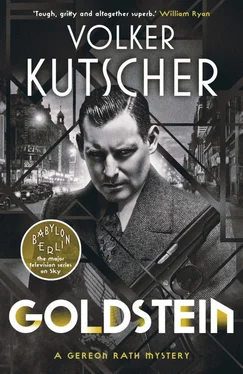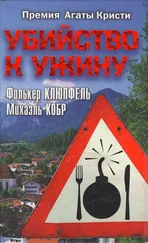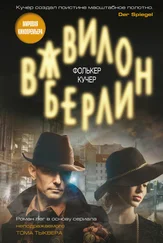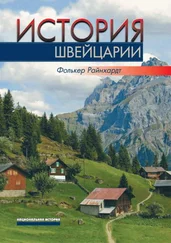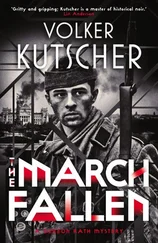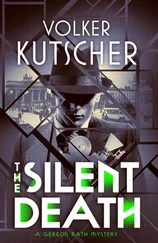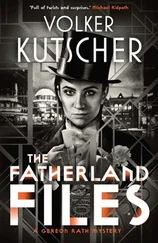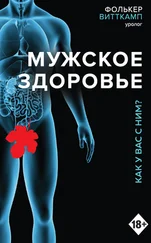Now, they stood at the base of the stairs: Gennat, Rath and the squad leader with his men. They had taken a dozen uniform officers along with them. Every so often the wooden stairs emitted a tired protest, as if unused to carrying so much weight.
Rath and Böhm had discovered that Assistant Detective Grabowski must be the Castle’s leak at more or less the same time. Böhm, still angry that confidential information pertaining to the Goldstein investigation had been passed straight to the press, narrowed the list of suspects one by one. Only seven people had known what Abraham Goldstein looked like: Gereon Rath and his three men, Deputy Police Commissioner Bernhard Weiss, CID Chief Scholz and the female employee who had received the telex from America and passed it on.
At first Böhm focused on Rath and his men, whom he obviously thought capable of such indiscretion. He even briefly considered Weiss and Scholz for different, no doubt politically motivated, reasons. The one person he hadn’t reckoned with was the girl from the teleprinter’s office, an innocent in her mid-twenties. Eventually, however, she had been the only possibility remaining, and, after a marathon interrogation, had confessed to having mentioned Goldstein’s imminent arrival to a fellow officer in the canteen.
That fellow officer had been Assistant Detective Helmut Grabowski. The same assistant detective whom the porter at the Scherl building recognised as the man who had delivered the mysterious envelopes to Stefan Fink.
At first Grabowski stubbornly maintained that he had acted under his own steam, but when Gennat confronted him, bit by bit, with the statements Lanke junior had already made, he cracked. Gregor Lanke, whom Rath had softened up the week before, appeared to be a relatively small cog in the machine.
Then there were the names Charly had been able to throw in. Over the past few days she had gazed at hundreds of police portraits. Gennat hadn’t summoned her to Alexanderplatz but to a safe house. His co-conspirator was his trusted secretary Trudchen Steiner, with whom Charly continued to live for security reasons, and with whom she would stay until Scheer and Tornow were safely behind bars.
The picture they put together was shocking. Die Weisse Hand. The White Hand. A secret band of frustrated police officers, who were tired of the judicial system releasing people onto the streets after they had bust a gut to put them behind bars. Police officers who had resolved to go over and above the call of duty, and play judge, jury and executioner. Their aim: to eliminate the most notorious criminals in Berlin’s underworld.
Police officers who were moments away from being arrested.
They arrived upstairs. Everything in the attic flat was dark. They hadn’t switched on the light in the stairwell. Only a little twilight filtered through from outside. It took a lot of effort but Rath could just about read the nameplate on the door. S TORNOW. Only a week ago, he had been here thinking he had made a new friend. How quickly things changed.
Gennat had paused on the stairs. Rath gave the squad leader the nod. He waved at his men and they stepped into action like a perfectly rehearsed ballet troupe. The first man kicked in the door and the second peeled inside, firearm at the ready, followed by three colleagues. Rath remained outside, his Walther primed, even if he didn’t think Tornow would come out shooting.
The squad leader emerged from the flat shaking his head. ‘No one home,’ he said.
Rath cast a brief a glance over the flat. It didn’t look as if Tornow had fled. His gaze fell instead on the gasometer at the end of Leuthener Strasse. He exited the flat and the officers descended once more, frustrated as ever after a futile operation. Gennat was waiting for them at the foot of the stairs.
Rath shrugged. ‘No one home, but I’d be willing to bet I know where he is.’
Perhaps Tornow had an inkling after all, Rath thought, as they approached the gasworks, although it wasn’t public knowledge that Helmut Grabowski and Gregor Lanke had been arrested, let alone interrogated.
Rath had waylaid Gregor Lanke outside the canteen, using the pretext of a confidential discussion to lure him out to Schöneberg. The detective had been astonished to find Superintendent Gennat and Chief Inspector Böhm waiting for him in the priest’s office at Saint Norbert’s. Once he had recovered from the shock, Lanke had seemed genuinely relieved by the presence of Buddha, and unburdened his soul.
Grabowski, meanwhile, was part of Böhm’s team. All the Bulldog had to do was summon him. The assistant detective from Homicide was, by far, the harder nut to crack, but Gennat’s doggedness, allied with Lanke’s statements and the names Charly had provided, finally broke him.
Rudi Scheer seemed to act as a kind of patron, placing the necessary means at the group’s disposal for specific operations. Grabowski claimed that Scheer was still involved in weapons trafficking, though it would be difficult to prove. The only lead they had was an illegal arms dealer in Grenadierstrasse. Goldstein confirmed that was where he had purchased the Remington. He got the address from Marion, who at that time had been working on behalf of Gregor Lanke and Die Weisse Hand. Somehow, in the maze, Goldstein had become an important witness.
But that was another story entirely.
Even if Scheer had provided the money, the group’s driving force was Sebastian Tornow, young as he was. The two hoods he had told Rath about, who had apparently lost their lives as part of a gangland war, the two who had ruined his sister’s life, had been his first victims. In Rudi Scheer, whom he must have met in the early stages of his training, Tornow recognised a kindred spirit. From that point, the pair had surrounded themselves with men who shared their worldview. Gräf, too, had been sounded out by Tornow, when asked whether a good police officer ought to be able to kill.
In Tornow’s eyes, the answer was yes. Jochen Kuschke, meanwhile, who had taken this principle too much to heart, had to die, because he had acted impetuously and become a danger to the organisation. His fate, so Grabowski said, had been sealed at a secret night-time meeting of group members. In the end Tornow took the job upon himself because Kuschke, his erstwhile superior officer and mentor, had trusted him the most.
They reached the site of the gasworks without any trouble. As Tornow had said, only signs forbade people from climbing the gasometer. They described such behaviour as strengstens verboten , the sound of which alone was enough to make would-be offenders recoil.
Rath was used to breaking rules.
‘Wait here with your men,’ he said to Gennat. ‘I’ll see if anyone’s up there.’
Before Gennat could say anything, he was on his way.
Scaling dizzying heights was hardly the stuff of his innermost dreams, but this was personal. Tornow had taken Charly from him and made her suffer for two days. If he was crouched up there, admiring Berlin’s night sky, then he, Gereon Rath, wanted to be the one to tell him he was under arrest.
The gasometer was a massive, barrel-shaped guide frame, a steel, half-timbered construction, around eighty metres high, in which the gas bell patiently went about its business. A kind of fire escape led upwards, a steel staircase the like of which could sometimes be seen in tenement houses. After four steps, Rath reached the first maintenance gangway, a steel ring of catwalk grating that extended around the whole gasometer. There was one every ten or so metres, but Tornow’s spot was up on top of the gas holder, not on one of the maintenance gangways. Rath continued.
On the first landing he held to his resolution not to look down, but at one point he inadvertently took the risk, and instantly regretted it. He held on tight to the rail and hunkered down. Below he could see Gennat talking to a man, probably the night watchman. Buddha pointed skywards and Rath tried to look the other way, up inside the structure, to dispel the feeling of vertigo. The framework’s interior was filled by an enormous steel cylinder that was in motion day and night, rising and falling, as gradually as the sun and moon, and just as inexorably, an irresistible, relentless force. Cantilevers with guide pulleys ran via tracks into the vertical steel ribs to ensure the gas bell breathed steadily. Rath thought he could see it slowly descending as the bell exhaled again, an operation that would last the entire night. The heavy telescopic bell descended at a speed that was barely discernible, compressing the gas into the network of lines and hoses that played their part in illuminating Berlin’s night sky.
Читать дальше
